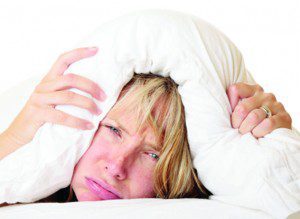

Some sleep disturbances include:
. Insomnia
. Restless Leg Syndrome
. Snoring
. Sleep Apnea
. Narcolepsy
. Night Terrors
. Frequent Urination
. Bed Wetting
Insomnia is probably the best known of these. 1 in every 3 adults claims to have Insomnia. Insomnia keeps people from falling asleep and/or staying asleep at night. Many wake up very early without getting a satisfying amount of sleep. Exercises, for both the mind and body, are recommended for treatment. Meditation, for example, can help calm your racing thoughts. It is also good to stay active during the day without taking naps. By the time its “lights out”, you will be more than ready.
Restless Leg Syndrome can happen to anyone, at any age. This disorder causes people to have a painful sensation, as if something is crawling on their legs. Their legs may itch and feel as if there are needles poking them. Restless Leg Syndrome got its name from this uncomfortable feeling that intensifies when the body is not in motion. Because of this, people want to move and walk around; which, therefore, makes it extremely difficult to fall asleep. Those who have a nerve disease, are pregnant, or have an iron deficiency are at a greater risk of this disorder. Home remedies recommended to patients include hot and cold massages of the legs, yoga, meditation, and over the counter pain relievers.
Snoring occurs when the tissues in our airways become relaxed and rub against each other. The airflow becomes constricted causing the “all too familiar” sound. Snoring can affect your bed partner, too. They often have trouble falling asleep, or wake up, due to the noise. Nose strips are suggested for people who snore. If you’re the bed partner of a snorer, try rolling them on their side. Snoring and sleep apnea can also go hand in hand.
Sleep Apnea may be the reason for you, or your bed partner’s snoring. It causes people to stop breathing momentarily during their sleep. The lapse in breath usually lasts more than 10 seconds and can be detrimental to one’s health. If you have sleep apnea, you should get treated immediately. A Continuous Positive Air Pressure (CPAP) mask can help keep your airway open when sleeping. This is not the only treatment for sleep apnea, though it is the most popular.
Narcolepsy is one of the more serious sleep disorders. There are four different stages of sleep. The first three stages are in the category of NREM (Non Rapid Eye Movement). This is when a person is “falling asleep”. After these stages, which generally add up to 90 minutes combined, a person falls into the REM (Rapid Eye Movement) stage. People with Narcolepsy can spontaneously fall into REM sleep at any time of the day. Sleeping is not dangerous. But, depending on when and where a person suddenly falls asleep, severe problems can occur.
This sleep disorder affects about 1 in every 2,000 Americans. The symptoms usually present themselves between the ages of 10 and 25-years-old. Those with Narcolepsy are recommended to regularly exercise, keep away from alcohol and nicotine, and get on a healthy diet. As well, there are medications that can help.
Sleep specialists and sleep laboratories are available to help with any of these sleep disorders. Sleep Labs are solely intended to study you while you are asleep. This helps them determine your sleep disorder and which treatments are best suited for you. Patients wear different monitors while sleeping to get their heart activity, blood pressure, and brain activity recorded.
Dr. Mitchell L. Petusevsky is a well-respected sleep specialist and founder of The Center for Sleep and Pulmonary Medicine. He has 30 years of experience under his belt and has been chosen as one of the top physicians in all of Southwest Florida. If you have any questions regarding sleep disorders, you can contact Dr. Petusevsky of Millennium Physician Group for more details at (239) 263-8385. Their clinics are located in both Naples and Bonita Springs.
Millennium Physician Group
700 2nd Ave. N., Ste 305, Naples, FL 34102
239-263-8385 | www.MillenniumPhysician.com
 Southwest Florida's Health and Wellness Magazine Health and Wellness Articles
Southwest Florida's Health and Wellness Magazine Health and Wellness Articles
